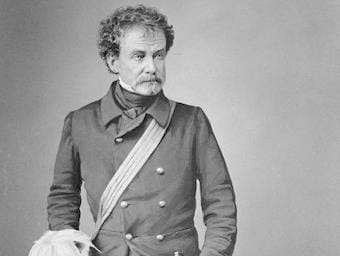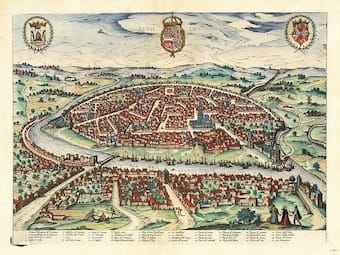175
Our peculiar brand of democracy and liberty is a noble thing, but we should be wary of recommending it to other countries.
Historian Mandell Creighton believed unlike our Continental neighbours, when the English laid down our Constitution we were driven not by ideological purity or a passion for order but by a desire to protect our customs and little oddities. Though this worked well for us, foreign nations had some trouble getting it to work for them — and they were starting to notice it.
Picture: © John Fielding, Wikimedia Commons. Licence: CC BY-SA 2.0.. Source.
Posted May 13 2023
176
The Indian Mutiny began with a revolt among disgruntled soldiers, and ended with the making of the British Raj.
By 1857, the East India Company, a British government agency, had been running India for a hundred years. The Company’s ruthless acquisition of territory, and its high-handed treatment of respected figures and institutions, alienated Indians of all classes; and that May, soldiers in the Company’s militia rose up against their officers. Jawaharlal Nehru explains what happened next.
Picture: From the Royal Archives, Windsor Collection, via Wikimedia Commons. Licence: Public domain.. Source.
Posted May 12 2023
177
Incompetence, arrogance and some mischievous propaganda all conspired to throw India into chaos.
In 1757, the British East India Company took control of most of India on behalf of the British Government. The Company employed a large number of Indian-born soldiers in their private army, including Muslims, Sikhs, and in 1857 some of these ‘sepoys’ rose up in rebellion. The reasons were complex, but clearly explained here by two Indian schoolmasters, writing in 1944.
Picture: Photo by the Smithsonian Museum, via Wikimedia Commons. Licence: Public domain.. Source.
Posted May 11 2023
178
A young Nathaniel Hawthorne recalls a confidential conversation with a tired old horse.
On June 1st, 1816, Robert Hawthorne presented his nephew Nathaniel, a month shy of his twelfth birthday, with a diary ‘with the advice that he write out his thoughts, some every day, in as good words as he can’. It was in this diary that Nathaniel recalled running across an underfed working horse, agonisingly forced to listen as his master ground delicious corn at nearby Dingley mill.
Picture: © Flocci Nivis, Wikimedia Commons. Licence: CC BY-SA 4.0.. Source.
Posted April 30 2023
179
Robert Tomson was a typical Englishman and it nearly killed him, but it also made him a fortune and won him a bride.
In a prestigious lecture on the English national character in Oxford, historian Mandell Creighton developed the theme that unlike our European neighbours we don’t much care what others think of us. Sometimes this is good, sometimes bad and sometimes, as in the case of sixteenth-century emigrant Robert Tomson, both.
Picture: By Georg Braun (?-1622) and Frans Hogenberg (<1540-1590). Source.
Posted April 28 2023
180
The English would not hand out so much unsolicited advice to foreign countries if they knew what they had been forced to endure.
In a lecture entitled ‘The English National Character’ historian Mandell Creighton argued that the English were the first to create for themselves a national character, standing aloof from the debates and upheavals of the Continent and muddling along in their own way. Over the years, this had made the English into one of the great nations of the world, but it had also made them insensitive and frankly very annoying.
Picture: © Boris Sakic, Wikimedia Commons. Licence: CC BY-SA 4.0.. Source.
Posted April 27 2023





